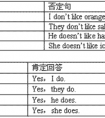选出错误的选项并改正。( ) 1. He likes to skate on an ice. _________________ ABC ( ) 2. On winter, he likes to ski. _________________A B C ( ) 3. Here is my -六年级英语
Where are you from? 你是哪里人?
He diedf rom an accident. 他死于一场事故。
(7)of……的,属于……
This is a map of China.这是一张中国地图。
(8)with使用、和……在一起
We write with a pen. 我们用笔写字。
Can you go to the park with me? 你能和我一起去公园吗?
注意:在last, next, this, that, some, every 等词之前一律不用介词。如:We meet every day.
小学常见介词:
1.on
(1) 在------上面 The book is on the desk.
(2) 在------(哪一天/星期)What do you do on Wednesday?
(3) 在------(月、日)My birthday is on August 2nd.
2. in
(1)在------里面 The pens are in the pencil-box.
(2)在------(哪一年/月)His birthday is in October.
He worked here in 1992.
(3 ) 在------(地方) He works in Dongguan.
(4 ) 在------之内 What are you going to do in 20 years?
(5 ) 在------(早上、下午、晚上)
I do morning exercises in the morning every day.
I usually play basketball in the afternoon.
I often do my homework in the evening.
3. under
在------底下 There is a ball under the bed.
4. near
在------附近 There is a book shop near our school.
5. in front of
在------前面 A boy is standing in front of the house.
6. beside
在------旁边 A football is beside the door.
7. next to
紧挨着 There is a bus station next to No. 13 Middle School.
8. over
在------正上方 A bridge is over the river.
9. on the left
在------左边 The bookstore is on the left.
10. on the right
在------右边 The hospital is on the right.
11. before
在……之前 Mike sits before me.
12. after
在------以后 He went home after school.
13. in the middle
在------中间 The road is in the middle.
14. at
(1) 在------(小地方) I am at school today. I was at home yesterday.
(2) 在------(点钟) I usually go to school at 8:00 am.
(3)看一看 Look at the blackboard.
(4) 在中午 at noon
15. behind
在------后面 There is a broom behind the door.
16.for
(1)给 This present is for you.
(2)为了 Thank you for telling me the way to the zoo.
(3)作为 We have some chips and hamburgers for lunch.
17.to
(1) 到 Take your sport shoes to the P.E class.
(2) 致 Happy birthday to you. Give it to your friend.
18. from
来自 I am from China. = I come from China.
19. from --- to
从------到------ Line up from shorter to taller.
We have class from Monday to Friday.
20. of
------的 He is a student of Kama School.
21. by
(1)在------之前 We must be at home by 6 o’clock.
(2)乘------交通工具 People can go to the moon by spaceship.
I go to school by bus.
22.with
(1) 用 I write a letter with a pen.
(2) 和------一起 He went to Shenzhen with his parents.
23. between
在------与------之间 There is a football match between Class One and Class Three.
24. into
到------里 Sharks can dive into the deep cold water.
25. like
(1)象------ The twins are like their father.
(2)长相------怎样? What’s he like?
26. up
向上 Put up your hands if you have any questions.
27. down
向下 Put down all the books here.
28. about
(1) 大约;关于 It’s about 6:00 now.
(2) ------怎么样? What about---? How about---?
29. what for
为什么 But what for?
早、午、晚要用in,at黎明、午夜、点与分。
年、月、年月、季节、周,阳光、灯、影、衣、冒in。
将来时态in...以后,小处at大处in。
有形with无形by,语言、单位、材料in。
特征、方面与方式,心情成语惯用in。
介词at和to表方向,攻击、位置、恶、善分。
日子、日期、年月日,星期加上早、午、晚,
收音、农场、值日on,关于、基础、靠、著论。
着、罢、出售、偷、公、假,故意、支付、相反,准。
特定时日和"一……就",on后常接动名词。
年、月、日加早、午、晚,of之前on代in。
步行、驴、马、玩笑on,cab,carriage则用in。
at山脚、门口、在当前,速、温、日落、价、核心。
工具、和、同随with,具有、独立、就、原因。
就……来说宾译主,对、有、方状、表细分。
海、陆、空、车、偶、被by,单数、人类know to man。
this、that、tomorrow,yesterday,next、last、one。
接年、月、季、星期、周,介词省略已习惯。
over、under正上下,above、below则不然,
若与数量词连用,混合使用亦无关。
beyond超出、无、不能,against靠着,对与反。
besides,except分内外,among之内along沿。
同类比较except,加for异类记心间。
原状because of,、 owing to、 due to表语形容词
under后接修、建中,of、from物、化分。
before、after表一点, ago、later表一段。
before能接完成时,ago过去极有限。
since以来during间,since时态多变换。
与之相比beside,除了last but one。
复不定for、找、价、原,对、给、段、去、为、作、赞。
快到、对、向towards,工、学、军、城、北、上、南。
but for否定用虚拟,复合介词待后言。
ing型由于鉴,除了除外与包合。
之后、关于、在......方面,有关介词须记全。
in内to外表位置,山、水、国界to在前。
考点名称:现在进行时,现在分词
现在进行时:
表示动作发生的时间是“现在”,动作目前的状态是“正在进行中”。所谓“正在进行中”,是指在谈到这件事的时候,这个动作还在进行中。
现在进行时由“系动词am/ is/ are+动词-ing形式”构成。
例:We are reading the text. 我们正在读课文。
My sister is working in a hospital. 我的妹妹在医院工作。
They are watching TV now. 他们正在看电视。
What are you doing, Li Lei? 你现在正在干什么,李雷?- 现在进行时的基本用法:
A表示现在( 指说话人说话时) 正在发生的事情。
例:We are waiting for you.
B. 表示现阶段正在进行的动作,说话时未必正在进行。
例:Mr. Green is writing another novel.
(说话时并未在写,只处于写作的状态。)
例:She is learning piano under Mr. Smith.
C.已经确定或安排好的但不确定会不会发生的将来活动。
I'm leaving for a trek in Nepal next week.(我下周要去尼泊尔旅行)
We're flying to Paris tomorrow.(我们明天乘飞机去巴黎) 一般现在时与现在进行时的区别:
一、准确理解两种时态的主要含义:
(一)一般现在时:
1.表示事物的本质特性或客观存在,没有时限性。
The table ____ soft。(feels) 表特性特征。
Japan ___ in the east of China。 (lives) 表客观事实
2.现阶段经常性、习惯性的行为,可带频率时间。
The shop closes at 7:30 p.m.
Father doesn’t smoke. (习惯)
3.表说话时的状态,感觉或结果,一般用状态动词,如:It doesn’t matter. Does it hurt? (感觉结果)
4.特殊用法:
-在条件、时间、让步从句中用现在时代替将来。
-If you go there,I’ll help you.
—用在begin,come,go,leave,return,open,close 等短暂谓语动词表规定计划。
The plane takes off at 11:30. (不受主观支配的计划)
-在剧本、解说、标题或there(here)开头的句中表进行
There goes the bell/Here comes Mr.Wang.
I declare the meeting opens.(正在宣布)
He meets the ball and hits back to No.2 (正在发生)
(二)现在进行时:
1.说话时正在发生,进行的动作
Look! Dark clouds are gathering . (正在发生)
2.表现阶段正在进行,但此刻不一定正在进行的事。
He usually gets up at 6:00,but this week he is getting up at 7:00. (现阶段正在进行,但说话时不一定在起床)
3.现在进行时的特殊意义
-表示主观打算常用于 go,come,leave,start,begin 等,位移、趋向动词。
- 最新内容
- 相关内容
- 网友推荐
- 图文推荐
| [家长教育] 孩子为什么会和父母感情疏离? (2019-07-14) |
| [教师分享] 给远方姐姐的一封信 (2018-11-07) |
| [教师分享] 伸缩门 (2018-11-07) |
| [教师分享] 回家乡 (2018-11-07) |
| [教师分享] 是风味也是人间 (2018-11-07) |
| [教师分享] 一句格言的启示 (2018-11-07) |
| [教师分享] 无规矩不成方圆 (2018-11-07) |
| [教师分享] 第十届全国教育名家论坛有感(二) (2018-11-07) |
| [教师分享] 贪玩的小狗 (2018-11-07) |
| [教师分享] 未命名文章 (2018-11-07) |


![Mrs Smith can _____ piano. [ ]A. play the B. playedC. plays the -六年级英语](http://www.00-edu.com/d/file/ks/4/1/19/2019-08-14/small7dd443171fd8fd01bff0ec5b631cd2a41565791318.jpg)

![Look! Thetwo are __________.[ ]A. thedifferent B. different C. thesame-四年级英语](http://www.00-edu.com/d/file/ks/4/1/19/2019-08-14/smalle5a45634611c2390d8031c73d46000df1565791186.gif)
